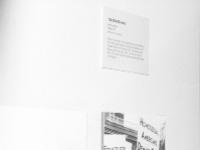I'm posting this entry on behalf of my intern, Ethan Fried, who performed extensive amounts of research and writing for the Preserving American Freedom digital history project, funded by Bank of America. For this project, Ethan described and annotated 50 documents that help trace the evolution of American liberties and composed biographies of related people and organizations. Ethan is a recent graduate of Pennsylvania State University and holds degrees in History and Secondary Education. His previous work as an undergraduate writing tutoring and high school teacher has left him determined to relate the intrigue of history to young people.
Pictured: Barbara Gittings in 1994
Coming into work on the SEPTA rail line offers a unique perspective on Philadelphia. Sprawling and large, the cityscape proves a sharp relief from my own hometown of Langhorne. Each day as I commute, while the rails squeak and the murmur of passengers fills the car, I often feel like I'm traversing worlds. In truth, I’m not yet comfortable walking around the city, save for my own route to the Historical Society. But the city, a modern incarnation of the place countless documents I've studied described, becomes more and more familiar by the day.
One such experience came just a few weeks ago on my way to work. Taking my usual 11th street exit from Market East Station, turning rightward towards City Hall and making a left onto 13th street, I noticed the name Barbara Gittings above the street corner of 13th and Locust. While not explicitly described by name, Gittings, famous for her progressive stances and tactics promoting gay rights, was a direct inspiration (and indeed, architect) of the "Dr. Anonymous" speech in the Preserving American Freedom exhibit. Countless times, I have walked through that intersection and looked upon that faceless name with an unknown history. But now that I know who she is, I can't help but pause, if only for a moment, at the foot of her namesake's sign. Just as I was exploring the old Philadelphia through manuscripts, letters, and maps, so was I encountering modern Philadelphia for the first time.
Speech of "Dr. Henry Anonymous" [John Fryer] at the American Psychiatric Association 125th Annual Meeting [May 2, 1972], one of 50 documents featured in the Preserving American Freedom project
This may be the most important effect of what I do here at HSP: to make history too important not to pass signs like Gittings's without a pause of understanding. The results of her efforts, and the efforts of the gay rights community, are clear. The Philadelphia "Gayborhood" is lined with rainbow signs and bars with names that drip with clear and public double entendre. Across the nation, gay rights supporters march ahead with the legalization of gay marriage, most recently in Maryland and Washington. All of this is a far cry from the reality of someone like Barbara Gittings. In her adolescence, homosexuality was considered a mental disorder. It took the courage of John Fryer, a gay psychiatrist that masked himself as he told his medical association that he could be both a productive psychiatrist and a homosexual to prompt the AMA to remove homosexuality from their list of disorders in 1973.
And although it's sometimes hard to dissociate the great movements of history from the people that sparked their creation and continued their sustenance, the past remains made by individuals like Barbara Gittings and John Fryer. The fact is, history can be so hard to connect with because it presents a place and time removed from our own. But when history is seen as a million intimate narratives, with a million voices, opinions, lives, and destinies, it becomes something else entirely. It becomes relatable. It becomes traceable. It becomes pause-worthy.
So the next time anyone asks why history can move and change us, and why it fills us with both wisdom and courage, I suggest bringing them to the corner of 13th and Locust and tell them the story of a man and woman who fought too hard for history to forget them. My guess is, they won't need to ask you that question anymore.


![Speech of "Dr. Henry Anonymous" [John Fryer] at the American Psychiatric Association 125th Annual Meeting [May 2, 1972]](/sites/default/files/dr_anonymous_1st_pg.jpg)